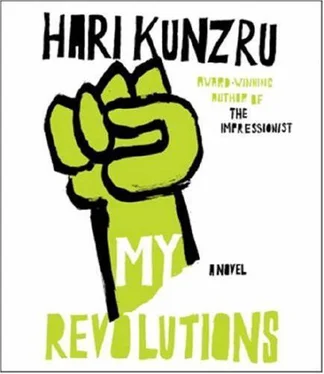I never found out why I came to be sent to HMP Pentonville. It was the recidivists’ prison. Remand prisoners went to Brixton,
first-timers like me to the Scrubs. It had a bad reputation, which a police constable gleefully told me all about as he led me out to the “meat wagon,” a Black Maria with metal-grilled windows. “The lags’ll have you for breakfast, you hippie cunt,” he told me cheerfully, as he locked me in.
As we got down from the van a gang of prison officers descended on us, screaming like squaddies performing a bayonet charge. We were doubled into a low hall, searched, and assembled into a ragged line. The screws marched up and down, shouting at us to stand up straight, poking us in the ribs and asking rhetorically if we knew where we were. They locked us into small wooden cubicles, where we stood in semidarkness while one of them read out the rules. The purpose of prison was to encourage and assist us to lead a good and useful life. We were to address all prison officers as “sir.” We would be required to perform useful work for not more than ten hours a day. Failure to obey an officer would be punished with removal of privileges. The list went on. When we could receive visits. When we could receive letters. More rules were written on a card pasted to the wall in front of me in the coffinlike cubicle. I peered at them as I waited. I was not to fight or set fires. I was not to possess a greater quantity of any article than I was authorized to possess.
I was pulled out of the cubicle by a pair of POs, and taken to the desks at the end of the room. Behind each desk sat a trusty with a red armband, writing in a ledger. I was ordered to stand on a scale and my weight was written down, along with my age and occupation. “Religion?”
“None,” I answered.
“C of E, then,” said the prisoner-clerk.
“No, none,” I insisted. “I don’t believe in God.”
“That comes under C of E.”
I was frogmarched into a second room to stand before a PO who occupied a stool behind a high desk, like a Dickensian clerk. He ordered me to undress and as I took off my clothes, they were itemized and dropped into a cardboard box. I had to bend over and
spread my buttocks, then show the soles of my feet. Afterward I was given a dressing gown and taken to the showers, where the two POs escorting me shoved me into a stall and gave me an unhurried beating. Thought I was Fidel Castro? Long-haired wanker, I looked like a girl. They bet I took it like a girl. After a while it didn’t hurt so much. Water spattered over me as I pressed my cheek against the cold white tiles of the wall.
Round and round. Porte d’Orléans. Porte d’Orléans? Turning circles in the sea. Walking round the stupa , mindfully placing one foot in front of the other, counting my breaths. Round and round, circling the Old Building steps, under a banner that read, archly, BEWARE THE PEDAGOGIC GERONTOCRACY. Exactly the kind of thing nonstudents sneered at as studenty . It had taken only a few weeks at the LSE for that clever-clever tone to wear thin. Still, I knelt under that same banner to have my picture taken for the newspaper, along with all the other sitters-in, clever young people trying to look serious and committed and political, which would have been easier if they’d stopped grinning like chimps.
We were in occupation. Smile! Speak into the mike. “It’s not even about Adams per se , it’s what he represents. In Rhodesia he did nothing. He didn’t oppose the UDI, didn’t speak out when they started to arrest his students. The administration paints a picture of him as oh-so-brave, keeping his mixed college open while the Fascist, racist regime was consolidating power. But what’s that? Just collusion, as far as we’re concerned. Now he’s foisted on us as LSE director and we’re supposed to accept it without question.” It was freezing at night. None of us was prepared for a sit-in. No sleeping bags, no food. They locked the doors open, hoping that would be enough to get rid of us. A lot of people did slope off home.
There are moments from those eight days of occupation that stand out, images that over time have become unmoored from their context, floating free in my memory. Rolling a joint and passing it round with three friends as we sat by an open upstairs window, listening to a police inspector barking orders through a megaphone. Two students from my year busking folk songs and
rattling a tin. I had sex with a girl called Tricia in the toilets of the administration building. She wasn’t anything to do with the university, just one of the people who’d appeared out of the woodwork, attracted by the spark of possibility flitting temporarily around our stuffy college. There were mysterious middle-aged men with flasks of tea and sheaves of self-printed leaflets, feral-looking hippies, delinquent teens, raggedy thirties Marxists looking to warm their hands at the revolutionary fire.
You could make something out, dimly, through the blizzard of opinion that seemed to surround even the simplest question of right and wrong: change, the sense that everything was in play, all verities suspended. We were getting telegrams from the CGT union in Barcelona, from Bertrand Russell. We were a sign of something, the canaries in the capitalist coal mine, the Vanguard. We issued self-important statements: “WE HAVE CHALLENGED AND CONTINUE TO CHALLENGE THE WAY IN WHICH LSE SERVES THE NEEDS OF THE RULING CLASS IN PROVIDING THE RIGHT MANPOWER, STRONGER IDEOLOGY AND RESEARCH THAT MAKES EXPLOITATION AND OPPRESSION OF THE WORKING CLASSES MORE EFFICIENT.” Early one morning we broke into the administration building, barging past the night porter when he opened the door. We milled around in the corridor outside the director’s office, built barricades of chairs and desks and metal shelving, scribbled on the backs of notices, trying to formulate a statement for the press. I slept for a few hours, curled up with Tricia on the floor by a radiator. After a while I felt her get up. “Got to go toilet,” she said. “Go toilet,” like a child. She never came back. A week or two after the occupation I started to itch and went to visit the doctor, who gave a short speech about living in an era of moral confusion and used Latin to tell me I had crabs. Pacing up and down in my room, slathered in white cream from knee to chest, I read a letter from the university authorities saying that as a result of my participation in the sit-in I would be fined, but no further action would be taken.
Round and round. Did I agree with the written record of my personal effects? The deputy governor’s Home Counties voice was
crisp with authority regularly exercised and obeyed. Club tie, thick plastic-rimmed glasses, pompous donkey-face made longer by its mutton-chop sideburns. Beside him, shuffling papers and glowering at me, sat the stern, crop-haired chaplain in the role of the Church Militant. The welfare officer was asleep, from the look of him, hunched over his notes like a great black beetle. He didn’t move at all during the interview, presenting me with his balding crown, a featureless pink oval that I gradually came to think of as his face.
Yes, I said. I agreed with the written record of my personal effects.
The chaplain said he believed I was Church of England, and looked forward to seeing me in chapel. I’d derive much sustenance from attending services. The deputy governor wanted me to take the opportunity to ask myself some hard questions. I was an educated fellow. He hoped I’d come to see that my posture of rebellion was essentially immature. We were living in changing times, which made it all the more regrettable that certain irresponsible social elements were leading some of our best and brightest to squander their advantages, advantages most of the young lads in this place would give their eye teeth for. Watching one hand seamlessly over to the other, I started, for the first time since my trial, to recover myself. God-man and state-man, working in concert, indistinguishable in their pose of bland benevolence. When I moved I could feel the bruises from the previous day’s beating. Fuck you, I thought. Fuck you and your polite, civilized tone. Fuck your unearned air of authority, your smug talk about advantages, as if the world is some kind of game you’re refereeing.
Читать дальше












